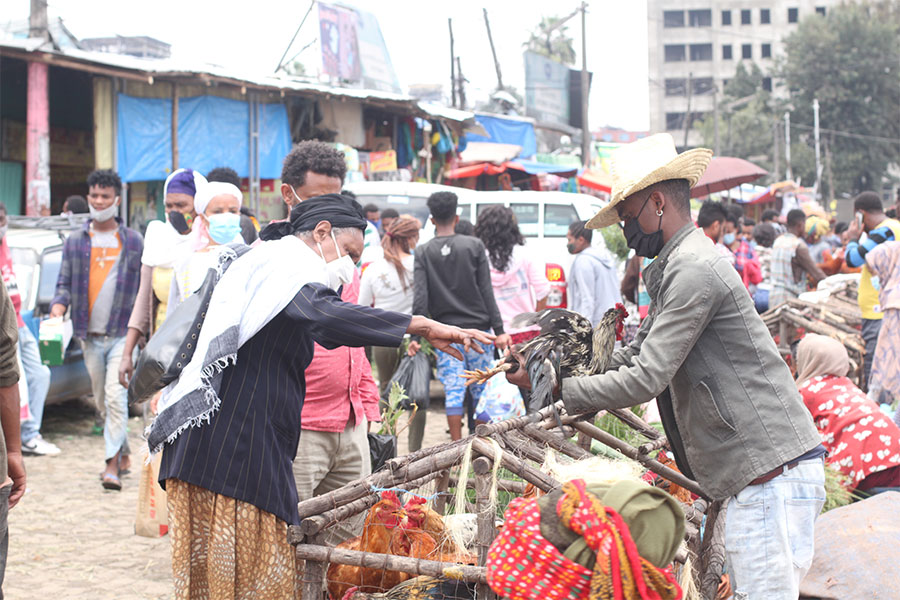
Feb 22 , 2020
By Andrew DeCort ( Andrew DeCort, who holds a PhD in ethics from the University of Chicago and has lectured at the University of Bonn, Wheaton College and the Ethiopian Graduate School of Theology. )
We thought it was a mobile app, an exchange of ideas, a hotel, a newspaper, a website, an interpretation of historical data (one way or another), a name, a bottle of water, a kid dying in the street, unity, justice, a party or a religion. But these things have become symbols of “the other.” This is contemporary Ethiopia.
Nearly everything has become transfigured by identity. The thick moss of othering – seeing others as unrelated or less than ourselves – is growing over every inch of society and the inner society of our minds.
Success is a cause for resentment - “they” must have been privileged because of their identity (sometimes true). Struggle is proof of victimisation - “we” have been oppressed because of our identity (sometimes true).
Politics has become the promise of “our turn” - not political policies but power emanating from one's identity, not a better future for all but a better future for “us.”
There is no shortage of stories to illustrate this reality.
Not long ago, I walked with several beautiful little girls, who literally bowed their tender faces to the dust in reverence for their church. I was touched by their piety. But then they spoke venomous, extremist hatred for other ethnic groups.
What had their priests, their parents, their politicians taught them?
These beautiful, religious little children were infected with a virus more dangerous than COVID-19 - hate for others.
Another time, I encountered a brilliant business that was providing jobs and opportunity for countless rural farmers. But the local youth heard a false rumour that it belonged to someone from another ethnic group. They shot bullets at it and promised to blow it up with a rocket launcher if the business was not transferred to one of “theirs”.
Who cares about unemployment and poverty?
Either it belongs to "us", or it must be destroyed!
Yet another time, a prominent man with a kind heart took in a street boy to live with his family. But he could not tell his mother, because this boy is from the other ethnic group, and his mother would be angry that her son would let a boy from “them” into his home. He cannot even say his name. His compassion must remain secret even from his mother.
I experienced this firsthand after I helped a diabetic boy lying motionless in Mexico Square a few weeks ago. When I told his story on Facebook, several commenters ridiculed the story as a “fabrication” or “propaganda,” because the boy’s name indicates that he is from an ethnic group they apparently hate.
This is the reality. Religion, job creation, basic compassion - it has all become charged with othering.
Worship God and hate one's neighbour - no contradiction. Destroy jobs and love one's community - no contradiction. Be family but keep it a secret - no contradiction. Help the dying – but only as long as they are one of ours.
Albert Camus’s brilliant 1947 novel "The Plague" may give us the most profound insight into our current situation.
A man walks down the staircase in a hotel and trips over a dead rat. When he tells the doorman, the doorman is offended: “There are no rats in this hotel! How dare you say such a nasty thing!”
Even when dead rats are found in the streets, the officials deny it: “Our city doesn’t have rats!”
And then dead rats are found everywhere, and people can no longer deny the plague. But, then, of course, it is too late. The plague has overtaken the city, and people are dying and desperate to escape.
Othering is consuming Ethiopia. Others are seen as less or unrelated to oneself and one’s group. In fact, self and group have become nearly the same - a radical reduction of personhood into communal identity.
“We no longer have relationships; we have associations,” as a brilliant friend told me.
Identity has become externally aggressive and internally totalitarian.
“I thought I am a human being, but I have been regarded by others as a symbol of ethnicity. I cannot have my own opinion on almost anything. I cannot interact with others freely for fear that my actions and opinions would be interpreted as an attack against some ethnicity. I can hardly make friends with others for fear that some people may associate my friendship or partnership as an act of treason against ‘my’ ethnicity. I have become a slave to ethnicity,” a friend recently confessed to me.
Othering is fueling suspicion, resentment and violence. This condition is fueling poverty, death and war. The way we see others is producing the society we see – public killings, abductions, displacements, closed universities.
Of course, many will be offended at such a suggestion. Our religion would never do that! Our youth would never do that! Our mothers would never do that! There are no rats here!
But dead rats are everywhere. We can hardly do anything without tripping over one or someone throwing one in our faces. We all know this.
It is time to see the other as a neighbour, someone with precious value regardless of their ethnicity, religion or politics. A neighbour is someone close to our heart who matters to us. This is the historic ethical teachings of Judaism, Christianity, Islam and democracy. Neighbor-love is the lens that can heal our vision of others and the society we share.
“Identity is not a prison; it is an appeal for dialogue with others,” Vaclav Havel, former president of Czechoslovakia, understood. “Love for one’s fellow humans is the central commandment of all our contending cultures.”
It is time to celebrate our differences as a reflection of our shared humanity, which shines like a diamond with a thousand colours. This is how we came to be. This is how we can flourish.
The time is late. The virus of hateful othering is entrenched and rapidly spreading. We must love our neighbour or destroy one another.
“I have realised that we all have plague; and I have lost my peace. And today I am still trying to find it; still trying to understand all those others and not to be the mortal enemy of anyone,” wrote Camus in The Plague. “I only know that one must do what one can to cease being plague-stricken, and that’s the only way in which we can hope for some peace or, failing that, a decent death ... each one of us has the plague within him; no one, no one on earth is free from it.
“And I know, too, that we must keep endless watch on ourselves lest in a careless moment we breathe in somebody's face and fasten the infection on him ... The good man, the man who infects hardly anyone, is the one who has the fewest lapses of attention.”
PUBLISHED ON
Feb 22,2020 [ VOL
20 , NO
1034]

Life Matters | Jun 07,2025

Editorial | Nov 14,2020

Commentaries | Jan 19,2024

Viewpoints | May 15,2021

Viewpoints | Apr 04,2020

View From Arada | Nov 20,2021

Agenda | Sep 11,2020

Commentaries | Sep 19,2020

Viewpoints | May 01,2020

International Stories | Apr 16,2020

Dec 22 , 2024 . By TIZITA SHEWAFERAW
Charged with transforming colossal state-owned enterprises into modern and competitiv...

Aug 18 , 2024 . By AKSAH ITALO
Although predictable Yonas Zerihun's job in the ride-hailing service is not immune to...

Jul 28 , 2024 . By TIZITA SHEWAFERAW
Unhabitual, perhaps too many, Samuel Gebreyohannes, 38, used to occasionally enjoy a couple of beers at breakfast. However, he recently swit...

Jul 13 , 2024 . By AKSAH ITALO
Investors who rely on tractors, trucks, and field vehicles for commuting, transporting commodities, and f...

Jun 28 , 2025
Meseret Damtie, the assertive auditor general, has never been shy about naming names...

Jun 21 , 2025
A well-worn adage says, “Budget is not destiny, but it is direction.” Examining t...

Jun 14 , 2025
Yet again, the Horn of Africa is bracing for trouble. A region already frayed by wars...

Jun 7 , 2025
Few promises shine brighter in Addis Abeba than the pledge of a roof for every family...